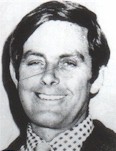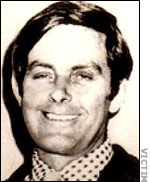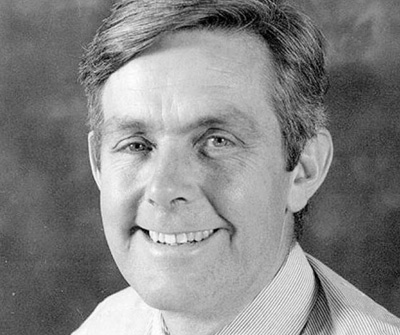



Donald Mackay was last seen outside the Griffith Hotel NSW on July 15th, 1977 at about 6pm after he had been having a drink with some friends. Donald was a prominent anti drugs campaigner and it is believed he was murdered. An investigation of the scene where Mackay's locked van was parked revealed blood stains, car keys and three spent .22 shell casings.
Donald's body has never been located thus he is still a missing person.
December 01, 2007 12:10am
Queensland University of Technology historian John Jiggens, in a book to be launched today, names criminal banker Frank Nugan and reputedly corrupt former NSW policeman Fred Krahe as the leading figures behind the murder. Fortunately for Dr Jiggens, both men are long dead.
Mackay, a furniture store owner in the NSW Riverina town of Griffith and a former Liberal candidate in state and federal elections, disappeared after leaving the Hotel Griffith about 6.30pm on July 15, 1977. His bloodstained car and three spent .22 cartridges were found in the hotel carpark the next day. Mackay's body was never found.
In 1975, Mackay had tipped off police about a huge marijuana plantation at Coleambally, south of Griffith.
Dr Jiggens said yesterday he came across evidence linking Nugan and Krahe to the murder "quite accidentally" while researching for his QUT doctoral thesis on the history of marijuana prohibition in Australia.
Nugan, a lawyer who was born in Griffith and went to school with Mackay, was a partner with former US Green Beret Michael Hand in the notorious Nugan Hand Bank, a Sydney-based merchant bank that collapsed in 1980 amid allegations it was involved in laundering drug money.
In his book, The Sydney Connection: Nugan Hand, Murray Riley and the Murder of Donald Mackay, Dr Jiggens alleges Nugan and cop-turned-criminal Murray Riley were key figures in an international drug-smuggling group supplying the US market in the 1970s.
Dr Jiggens says that two weeks before Mackay disappeared, Nugan sent Krahe to Griffith to investigate discrepancies in the accounts of the Nugan family fruit company, which he alleges was a front for marijuana distribution.
He believes Mackay was murdered because he had uncovered the role played by Nugan and the Nugan Hand Bank in the illegal drug trade.
Dr Jiggens, who believes Hand paid Krahe to kill Mackay, is not the first to accuse the former cop of involvement in the murder. In April 1986, Victorian hit man James Frederick Bazley was convicted of conspiring to murder Mackay. Interviewed in Melbourne's Pentridge prison by a reporter in November 1987, Bazley claimed he had been framed and blamed Krahe for the murder.
The last journalist to speak to Mackay was John Higgins, the editor of the Murrumbidgee Irrigator. In 1987, Higgins said he had talked to Mackay for about half an hour on the morning before he was murdered. He said that among other matters he discussed with the anti-drug campaigner was Krahe's arrival in Griffith.
Higgins said Mackay's exact words were: "Fred Krahe is back in town. I wonder what job he has this time."
In 1974, Mackay ran for the federal seat of Riverina, then held by the flamboyant Whitlam minister Al Grassby. Mackay's preferences helped National Party candidate John Sullivan defeat Grassby. The murder of Mackay prompted premier Neville Wran to appoint judge Philip Woodward to lead a royal commission into drug-dealing. Woodward found that Mackay had been murdered by a hitman hired by "The Honoured Society", a Griffith-based cell of the mafia.
Nugan was found shot dead in an apparent suicide outside Lithgow, NSW, in January 1980.
Krahe died of natural causes in December 1981.